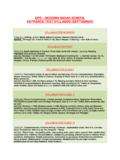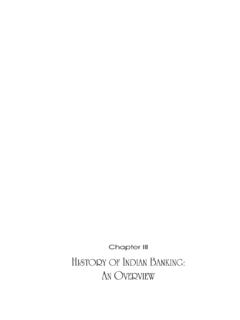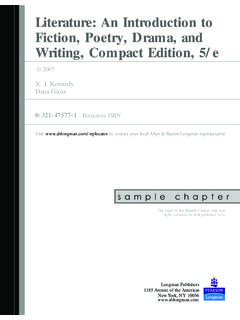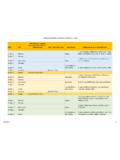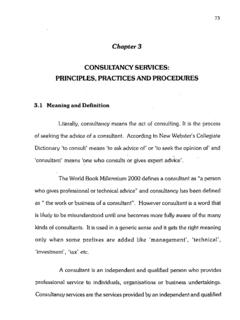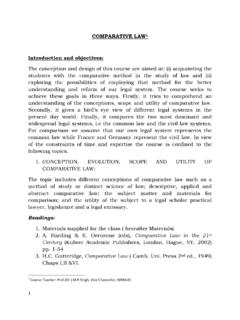Transcription of THE PHARMACY ACT, 1948 INDEX CHAPTER 1 …
1 THE PHARMACY ACT, 1948 INDEXCHAPTER 1 INTRODUCTORY1 Short title, extent and commencement2 InterpretationCHAPTER 2 THE PHARMACY COUNCIL OF INDIA3 Constitution and Composition of Central Council4 Incorporation of Central Council5 President and Vice-President of Central Council6 Mode of elections7 Term of office and casual vacancies8 Staff remuneration and allowances9 The Executive Committee9aOther Committees10 Education Regulations11 Application of Education Regulations to States12 Approved courses of study and examinations13 Withdrawal of approval14 Qualifications granted outside the territories to which this Act extends15 Mode of declarations15aThe Central Register15bRegistration in the Central Register16 Inspection17 Information to be furnished17aAccounts andaudit18 Power to make regulationsCHAPTER 3 STATE PHARMACY COUNCILS19 Constitution and Composition of State Councils20 Inter-State agreements21 Composition of Joint State Councils22 Incorporation of State Councils23 President and Vice-President
2 Of State Council24 Mode of elections25 Term of office and casual vacancies26 Staff remuneration and allowances26aInspection27 The Executive Committee28 Information to be furnishedCHAPTER 4 REGISTRATION OF PHARMACISTS29 Preparation and maintenance of register30 Preparation of first register31 Qualifications for entry on first register32 Qualifications for subsequent registration32aSpecial provisions for registration of certain persons32bSpecial provisions for registration of displaced persons, repatriates and other persons33 Scrutiny of applications for registration34 Renewal fees35 Entry of additional qualifications36 Removal from register37 Restoration to register38 Bar of other jurisdiction39 Issue of duplicate certificates of registration40 Printing of register and evidentiary value of entries thereinCHAPTER 5 MISCELLANEOUS41 Penalty for falsely claiming to be registered42 Dispensing by unregistered persons43 Failure to Surrender certificate of registration44 Payment of part of tees to Central Council45 Appointment of Commission of Enquiry46 Power to make rules3 THE PHARMACY ACT, 1948 INTRODUCTIONIn India there was no restriction to practise the profession of PHARMACY .
3 One could practise this profession as any other profession. Persons, having no knowledge and having no education in PHARMACY or pharmaceutical chemistry or pharmacology, were engaged in this profession. Hundreds of cases were brought to the notice of the Government wherein the compounding, mixing, or dispensing of medicines was being done by persons who were not adequately educated in this line. The system was causing great harm to the health of people by wrong compounding, mixing or dispensing. It was found necessary to enact a law for the regulation of the profession and practice of PHARMACY . To achieve this goal the PHARMACY Bill, 1947 was introduced in the Legislature which was later referred to the Select Committee. The recommendations of the Selection Committee were incorporated in the OF OBJECTS AND REASONSIt is desirable that, as in most other countries, only persons who have attained a minimum standard of professional education should be permitted to practise the Profession of PHARMACY .
4 It is accordingly proposed to establish a Central Council of PHARMACY , which will prescribe the minimum standards of education and approve courses of study and examinations for Pharmacists, and Provincial PHARMACY Councils, which will be responsible for the maintenance of provincial registers of qualified pharmacists. It is further proposed to empower Provincial Governments to prohibit the dispensing of medicine on the prescription of a medical practitioner otherwise than by, or under the direct and personal supervision of, a registered 8 OF 1948 The PHARMACY Bill, 1947, having been passed by the Legislature received its assent on 4th March, 1948 . It came on the Statute Book as THE PHARMACY ACT, 1948 (8 of 1948 ).LIST OF AMENDING ACTS AND ADAPTATION ORDERS 1. The Adaptation of Laws Order, The Adaptation of Laws( ) Order, The PHARMACY (Amendment) Act, 1959 (24 of 1959).4. The PHARMACY (Amendment) Act, 1976 (70 of 1976).
5 5. The PHARMACY (Amendment) Act, 1982 (22 of 1982).6. The Delegated Legislation Provisions (Amendment) Act,1985 (4 of 1986).THE PHARMACY ACT, 1948 4(8 of 1948 )1[4th March, 1948 .]An Act to regulate the profession of it is expedient to make better provision for the regulation of the professionand practise of PHARMACY and for that purpose to constitute PHARMACY Councils; It is hereby enacted as follows:- CHAPTER 1 INTRODUCTORY1. Short title, extent and commencement. -(l) This Act may be called the pharmacyAct, [(2) It extends to the whole of India except the State of Jammu and Kashmir.](3) It shall come into force at once, but Chapters III, IV and V shall take effect in a particular State from such date 3[**] as the State Government may, by notification in the Official Gazette, appoint in this behalf:4[Provided that where on account of the territorial changes brought about by the reorganisation of States on the 1st day of November, 1956, Chapters III, IV and V have effect only in a part of a State, the said Chapters shall take effect in the remaining part of that State from such date as the State Government may in like manner appoint]2.
6 This Act, unless there is anything repugnant in the subject or context,(a) "agreement" means an agreement entered into under section 20;(b) "approved" means approved by the Central Council under section 12 or section 14; 5[(C) "Central Council" means the PHARMACY Council of India constituted undersection 3;(d) "Central Register" means the register of pharmacists maintained by the CentralCouncil under section 15A;(da) "Executive Committee" means the Executive Committee of the Central Councilorof the State Council,as the context may require;_____1. For Statement of Objects and Reasons, see Gazette of India, 1947, Pt. V, p. 469; and for Reportof Select Committee, see Gazette of India, 1948 , Pt. V, p. 6 The Act has been extended to Dadra and Nagar Haveli by Reg. 6 of 1963, sec. 2 and ; to Pondicherry by Reg. 7 of 1963, sec. 3 and Sch I; to Goa. Daman and Diu by Reg. 11 of 1963, sec. 3 and Sch. and to Lakshadweep by Reg. 8 of 1965, sec.]
7 3 and Sch. The Act has been modified in its application to the States of Maharashtra, Gujarat, Mysore and Rajasthan by 2814, dated 14th August, 1964, Gazette of India, 1964, Extra., Pt. II, Sec. 3(ii), p. 717. The Act has been modified in its application to the State of Tamil Nadu by the Madras Adaptation of Laws (Central Acts) Order, 1957 and the Madras Adaptation of Laws (Central Acts) Order, Subs. by Act 24 of 1959, sec. 2, for sub-section (2) ( 1-5-1960)..3. The words "not later than three years from the commencement of this Act, omitted by Act 24of 1959" sec. 2, ( ).4. Ins. byAct 24 of 1959 sec. 2 ( ).5. Subs. by Act 70 of 1976, sec. 2, for clauses (c), (d) and (e) ( 1-9-1976). The PHARMACY Act, 19485(e) "Indian University" means a University within the meaning of section 3 of the University Grants Commission Act, 1956 (3 of 1956) and includes such other institutions, being institutions established by or under a Central Actasthe Central Government may, by notification in the Official Gazette, specifyin this behalf;]1[(f) "medical practitioner" means a person---(i) holding a qualification granted by an authority specified or notified undersection 3 of theIndian Medical Degrees Act, 1916 (7 of 1916), or specified inthe Schedules to the Indian Medical Council Act.
8 1956 (102 of 1956); or(ii) registered or eligible for registration in a medical register of a State meant forthe registrationof persons practicing the modernscientific system ofmedicine; or(iii) registered in a medical register of a State, who, although not falling within sub-clause (i) or sub-clause (ii) is declared by a general or special order made by the State Government in this behalf as a person practicing the modernscientific system of medicine for the purposes of this Act; or(iv) registered or eligible for registration in the register of dentists fora State underthe Dentists Act, 1948 (16 of 1948 ); or(v) who is engaged in the practise of veterinary medicine and who possessesqualifications approved by the State Government;](g) "prescribed" means in CHAPTER II prescribed by regulations made under section 18,and elsewhere prescribed by rules made under section 46;2[(h) "register" means a register of pharmacists prepared and maintained underChapter IV;(i) "registered pharmacist" means a person whose name is for the time being enteredin the register of the State in which he is for the time being residing or carrying onhis profession or business of PHARMACY ;(j) "State Council" means a State Council of PHARMACY constituted under section 19,and includes a Joint State Council of PHARMACY constituted in accordance with anagreement under section 20;(k) "UniversityGrantsCommission" means the University Grants Commissionestablished under section 4 of the University Grants Commission Act, 1956 (3 of1956).
9 ]3[**] CHAPTER IITHE PHARMACY COUNCIL OF INDIA3. Constitution and Composition of Central Central Government shall, as soon as may be, constitute a Central Council consisting of the following members, namely:(a). six members, among whom there shall be at least one teacher of each of the subjects, pharmaceutical chemistry, PHARMACY , pharmacology and pharmacognosy elected by the 4 [University Grants Commission] from among persons on the teaching by Act 24 of 1959, sec. 3, for clause (f) ( 1-5-1960).2. Subs. by Act 70 of 1976, sec. 2, for clauses (h), (i) and (j) ( 1-9-1976).3. Clause (k), ins by the 1950 was omitted by Act 24 of 1959, sec. 3 ( 1-5-1960).4. Subs. by Act 70 of 1976, sec. 3, for "authority known as the Inter-University Board" ( 1-9-1976).The PHARMACY Act, 19486of anIndian University or a college affiliated thereto which grants a degree or diploma in PHARMACY :(b)Six members, of whom at least 1[four] shall be persons possessing a degree or diploma in, and practicing PHARMACY or pharmaceutical chemistry.
10 Nominated bythe Central Government:(c) One member elected from amongst themselves by the members of the MedicalCouncil of India;(d) the Director General, Health Services, ex officioor if he is unable to attend anyMeeting, a person authorized by him in writing todo so;2[(dd) the Drugs Controller, India, ex officioor if he is unable to attend any meeting,a person authorized by him in writing to do so;](e) the Director of the Central Drugs Laboratory, ex officio;'[(f) a representative of the University GrantsCommission and a representative ofthe All India Council for Technical Education;](g) one member to represent each 4[**] State elected 5 [from amongst themselves] bythe members of each State Council, who shall be a registered pharmacist;(h) Onememberto represent each 4[**] State nominated by 6[the] State Government,who shall be 7[**] a registered pharmacist:8[provided that for five years from the date on which the PHARMACY (Amendment) Act, 1976.]




